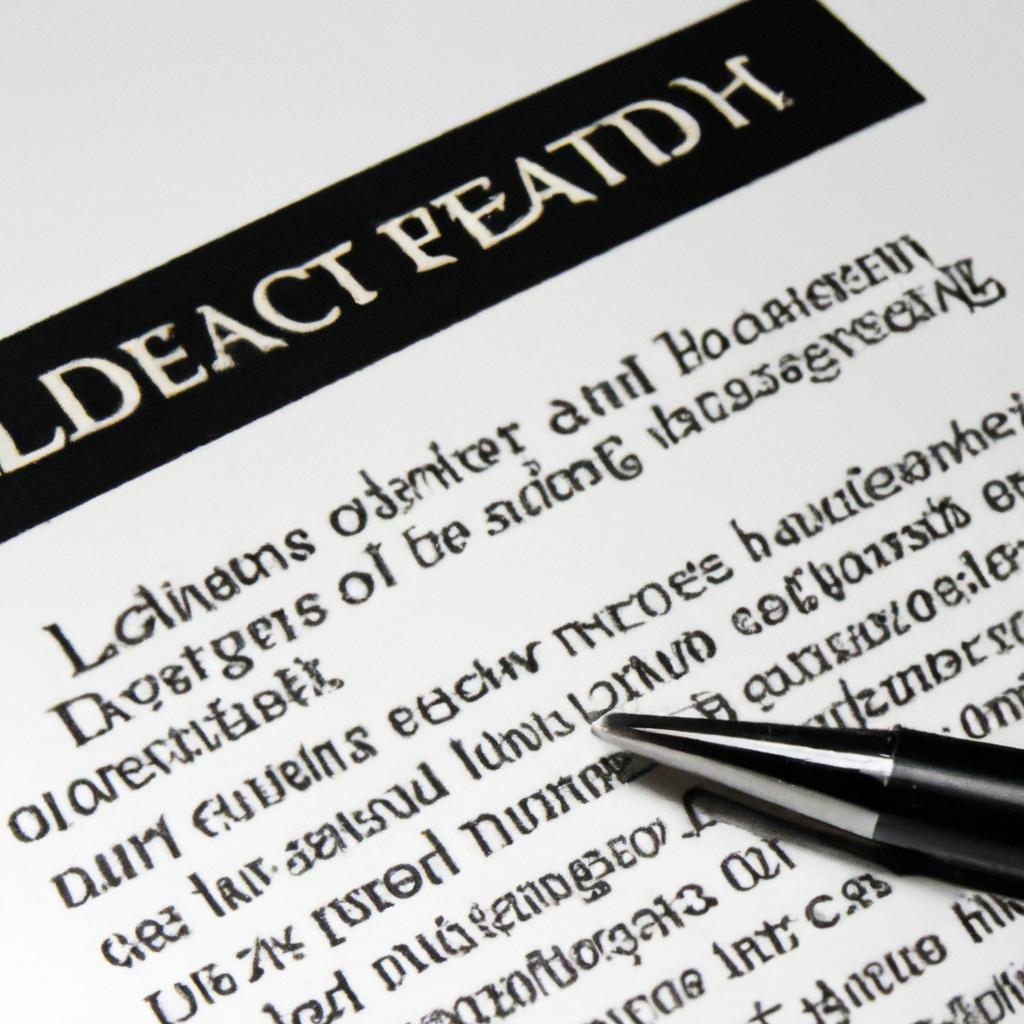As seasoned legal professionals at Morgan Legal Group in the bustling heart of New York City, we understand the intricacies and importance of property ownership. One crucial aspect of ensuring secure ownership of a home is obtaining the deed to the property. In this article, we will guide you through the proper steps and protocol for requesting the deed to your house with precision and clarity. Whether you are a first-time homeowner or a seasoned property owner, it is essential to navigate the process of obtaining this vital document with expert advice and knowledge. Let us equip you with the necessary tools to confidently secure your rightful ownership of your home.
Initiating the Request for Deed to Your House
When it comes to requesting the deed to your house, it’s important to follow the proper procedures to ensure a smooth and efficient process. One of the first steps you should take is to gather all necessary documents related to the property, including any previous deeds, mortgage documents, and proof of ownership. This will help to streamline the request and provide the necessary information to the appropriate authorities.
Next, you will need to submit a formal request for the deed to your house. This can typically be done through your local county clerk’s office or property records office. Be sure to include all relevant information, such as your name, the property address, and any identifying information related to the property. Additionally, it’s important to follow up on your request in a timely manner to ensure that the process is completed efficiently and accurately.

Understanding the Legal Process Involved in Requesting a Deed
When requesting a deed to a house, it is crucial to understand the legal process involved to ensure a smooth and successful transfer of ownership. The following steps outline the necessary procedures:
- Identify the current owner of the property.
- Determine the type of deed needed (e.g., warranty deed, quitclaim deed).
- Prepare the deed document with all necessary information and signatures.
- File the deed with the appropriate county office for recording.
It is important to seek legal guidance from a qualified attorney, such as the experts at Morgan Legal Group in New York City, to ensure that all legal requirements are met and the deed transfer process is executed properly. By following these steps and working with experienced professionals, you can navigate the legal complexities of requesting a deed to a house with confidence and ease.

Key Documentation Required When Requesting a Deed Transfer
**Documents Required When Requesting a Deed Transfer**
When requesting a deed transfer for a house, it is essential to have the appropriate documentation in order to ensure a smooth and legal process. The following key documents are typically required:
– Original Deed: The original deed to the property must be presented in order to transfer ownership to another individual or entity. This document serves as proof of ownership and must be carefully reviewed to ensure accuracy.
– Government-issued ID: A valid government-issued ID, such as a driver’s license or passport, is required to verify the identity of the individual requesting the deed transfer.
- Title Search Report: A title search report is necessary to confirm that there are no outstanding liens or encumbrances on the property that could affect the transfer of ownership.
- Purchase and Sale Agreement: If the deed transfer is part of a real estate transaction, a purchase and sale agreement detailing the terms of the sale must be provided to verify the transfer of ownership.
– Affidavit of Title: An affidavit of title may be required to confirm that the individual requesting the deed transfer has the legal right to do so and that there are no undisclosed parties with a claim to the property.
Having these key documents in order is essential when requesting a deed transfer for a house. It is important to work with experienced professionals, such as the team at Morgan Legal Group in New York City, to ensure that the process is completed correctly and in compliance with all legal requirements.
Mistakes to Avoid When Requesting a Deed to Your House
When requesting a deed to your house, it is crucial to avoid common mistakes that could potentially cause delays or legal issues down the line. Here are some key mistakes to steer clear of:
- Not verifying the accuracy of the deed: Before requesting a deed transfer, make sure to verify that all the information on the deed is correct. Any inaccuracies could lead to complications in the future.
- Skipping the formalities: It is important to follow the proper legal procedures when requesting a deed to your house. This includes submitting the necessary documentation and meeting any requirements set forth by local laws.
Additionally, it is essential to seek professional assistance from a reputable legal firm like Morgan Legal Group in New York City to ensure a smooth and legally compliant deed transfer process. By avoiding these common mistakes and seeking professional guidance, you can effectively request a deed to your house without encountering unnecessary obstacles.
Q&A
Q: What is a deed to a house?
A: A deed is a legal document that proves ownership of a property.
Q: Why would someone need to request a deed to their house?
A: Requesting a deed to your house is essential for proving ownership, applying for a loan, selling the property, or making any legal decisions regarding the property.
Q: How can I request a deed to my house?
A: You can request a deed to your house by contacting the county recorder’s office where the property is located and requesting a copy of the deed. You may need to provide identification and pay a small fee.
Q: What information do I need to provide when requesting a deed to my house?
A: You will typically need to provide the property address, your name as it appears on the deed, and any other relevant information the county recorder’s office may require.
Q: Can I request a deed to my house online?
A: Some county recorder’s offices may offer online services for requesting deeds, but it is best to check with the specific office to determine the available options for obtaining a copy of the deed.
Q: How long does it take to receive a deed once I request it?
A: The processing time for receiving a deed can vary depending on the county recorder’s office, but it typically takes a few days to a few weeks to receive a copy of the deed.
Final Thoughts
As you navigate the process of requesting the deed to your house, remember to approach it with patience and persistence. By following the steps outlined in this article, you can ensure that you have all the necessary documentation in order to officially claim ownership of your property. Don’t hesitate to reach out to legal professionals or local authorities if you encounter any obstacles along the way. With determination and diligence, you’ll soon be holding the deed to your house in your hands, solidifying your status as a proud homeowner. Good luck on your journey towards securing this important document!
 Title: How to Request Deed to Your House: A Comprehensive Guide
Title: How to Request Deed to Your House: A Comprehensive Guide
Meta Title: Learn how to request the deed to your house in simple and easy steps
Meta Description: Requesting the deed to your house can seem like a daunting task, but with the right knowledge and steps, it can be a smooth and hassle-free process. Read on to learn everything you need to know about requesting the deed to your house.
As a homeowner, obtaining the deed to your house is an essential step in securing ownership and protecting your property rights. A deed is a legal document that proves your ownership of the property and outlines all the necessary details, such as the property description, transfer of ownership, and any restrictions or easements on the property.
If you have recently purchased a house or have never gone through the process of requesting a deed, it can be confusing and overwhelming. But don’t worry, this comprehensive guide will walk you through the process step by step and equip you with the necessary knowledge to request the deed to your house.
Why Do You Need the Deed to Your House?
Before we dive into the process of how to request a deed, let’s understand why it’s crucial to have the deed in your possession.
1. Proof of Ownership: The most crucial reason to have the deed is to prove your ownership of the property. It is your legal right to possess and use the property as you please.
2. Protection of Property Rights: The deed includes any restrictions or easements on the property, which protects your rights as a homeowner. It also outlines any limitations on how you can use the property, ensuring that you don’t violate any regulations.
3. Required for Future Transactions: The deed is a crucial document that you will need when you decide to sell your property or pass it on to your heirs. It will serve as proof of ownership during the transfer process.
How to Request Deed to Your House?
Now that you understand the importance of having the deed to your house let’s dive into the process of how to obtain it.
Step 1: Locate the Deed
The first step is to locate the deed. If you have recently purchased the house, the deed should be with your closing documents. If you cannot find it, you can reach out to your closing attorney or title company, and they will provide you with a copy.
If you have owned the property for a while and don’t have the deed, you can request a copy from your county courthouse or recorder’s office where the property is located. You can also check your county’s tax assessor’s office, as they may have a copy of the deed.
Step 2: Check for Accuracy
Once you have located the deed, take some time to review it thoroughly. Check for any errors or discrepancies in the information, such as the property address, names of the previous and current owners, or any legal description of the property.
In case of any errors, contact the attorney or title company who handled the closing to have them corrected before proceeding.
Step 3: Determine the Type of Deed
Before requesting the deed, it’s essential to know the type of deed you have. There are four main types of property deeds:
1. Warranty Deed: This is the most secure type of deed as it guarantees that the property has a clear title and ensures the buyer’s protection.
2. Quitclaim Deed: A quitclaim deed transfers the ownership of the property from one party to another without any guarantees or promises.
3. Special Warranty Deed: This type of deed guarantees the property title only during the owner’s time of ownership.
4. Trust Deed: In a trust deed, the ownership is held by a trustee until the loan on the property is paid off.
Knowing the type of deed you possess will help you understand the limits and restrictions that may be attached to your property.
Step 4: Prepare a Deed Request Letter
Once you have verified the accuracy and determined the type of deed you have, it’s time to prepare a deed request letter. This letter should include your name and address, the property’s legal description, and a statement requesting a copy of the deed. It would be helpful to include a self-addressed, stamped envelope for convenience.
Step 5: Pay the Fees
Before submitting your request letter, it’s essential to check the fees associated with obtaining a copy of the deed. The fees may vary depending on the county and can range from a few dollars to a hundred dollars. Make sure to enclose a check with the exact amount to avoid any delays.
Step 6: Submit Your Request
Submit your deed request letter, along with the fees, to the recorder’s office or county courthouse where the property is located. You can also submit your request in person if you prefer.
Once your request is processed, you will receive a copy of the deed in the mail.
Practical Tips for Requesting Deed to Your House
– Ensure that your request letter is typed or written clearly to avoid any errors.
– Contact the recorder’s office or courthouse before making a trip there to verify their operating hours and any specific procedures for requesting copies of the deed.
– If you are unable to locate the deed, you can also contact your mortgage lender, as they usually retain a copy of the deed until the mortgage is paid off.
– It’s always a good idea to keep a copy of your deed in a safe location for future reference.
Conclusion
Requesting the deed to your house may seem like a complicated process, but with the right knowledge and steps, it can be a smooth and straightforward process. Remember to verify the accuracy, determine the type of deed, and include all the necessary information in your request letter. With this guide, you can now confidently request the deed to your house and protect your property rights.

